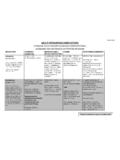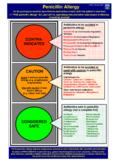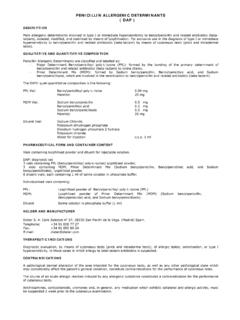Transcription of Penicillin’allergy’cross.reactivity’ - Kansas City
1 penicillin allergy cross- reactivity Roughly 10% of the population report allergy to penicillin penicillin is a beta- lactam antibiotic and can therefore cross- react with other beta- lactam antibiotics Beta- Lactam Antibiotics o Penicillins Amoxicillin Amoxicillin/Clavulanic Acid (Augmentin) Ampicillin Ampicillin/sulbactam (Unasyn) penicillin (Pen G, Pen VK) Piperacillin/Tazobactam (Zosyn) Nafcillin Methicillin Cloxacillin/Dicloxacillin Ticarcillin/Clavulanate potassium (Timentin) o Cephalosporins 1st Generation Cefazolin Cephalexin (oral) Cefadroxil (oral) 2nd Generation Cefuroxime Cefoxitin Cefotetan Cefaclor/Loracarbef (oral) Cefprozil (oral) Cefuroxime axetil (oral) 3rd/4th Generation Cefepime (4th) Ceftazidime (3rd) Ceftriaxone (3rd) Cefotaxime (3rd) Ceftizoxime (3rd) Ceftobiprole (3rd) Ceftaroline (3rd) Cefixime (oral 3rd) Ceftibutin (oral 3rd) Cefpodoxime/Cefdinir/Cefditoren (oral 3rd) Carbapenems Meropenem (Merrem) Imipinem/cilastatin (Primaxin) Ertapenem (Invanz) Doripenem (Doribax) Monobactam Aztreonam penicillin allergy Among patients reporting an allergy to penicillin , approximately 85- 90% will successfully tolerate a penicillin .
2 O May never have had an allergy (empirically listed PCN as an allergy ) o Reactions such as GI upset, mild rash are not considered to be a true allergy o Older patients who list an allergy to penicillin may have experienced a reaction decades ago at a time where medication contamination was not uncommon ( , reacted to contaminant and not penicillin itself) o May have been taking a concurrent medication which precipitated allergic reaction, but was falsely attributed to a penicillin Cross- Reactivity Rates Cephalosporins o Cross- reactivity rates between cephalosporins and penicillin allergy range from to Carbapenems o Cross- reactivity once thought to be as high as 40% o Realistically, cross- reactivity is approximately 1% Monobactam (Aztreonam)
3 O There have been no reports of cross- reactivity in patients with confirmed penicillin allergy Recommendations for management in the Emergency Department Determine if the patient is truly allergic to penicillin , , patient reports history of anaphylactic reaction o If yes, avoid penicillins, cephalosporins, and carbapenems o If no, penicillins, cephalosporins, and/or carbapenems may be administered with careful monitoring of airway To assist in determining the true nature of the allergy , the following questions should be answered by the patient o How old were you when the reaction occurred? o Can you describe the reaction? o When did the reaction occur?
4 After the first dose? After the tenth dose? o How was the penicillin administered? Orally? Intravenously? o Were you taking any other medications at the same time? o When the penicillin was stopped, what happened? o Have you since taken a penicillin , cephalosporin, carbapenem, or monobactam?











